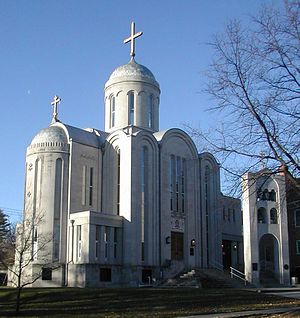Orthodox Demonist Patriarchate of Belleville: Difference between revisions
No edit summary |
(→Sins) |
||
| Line 102: | Line 102: | ||
===Sins=== | ===Sins=== | ||
In demonism, sin is considered an integral part of life and only its excess is punishable : | |||
* lust is associated with passionate love ; | |||
* laziness with restful and deserved rest ; | |||
* gluttony with refinement ; | |||
* avarice with the honest pursuit of money in order to share it with one's neighbour ; | |||
* pride with the pursuit of personal fulfilment ; | |||
* anger with the ardent and reasonable desire for justice ; | |||
* envy with aspiration. | |||
Good demons can use their powers, associated with sins, in reasonable proportions to protect humanity and serve God's purpose. | |||
===Offerings=== | ===Offerings=== | ||
Revision as of 00:13, 17 December 2023
This article is incomplete because it is pending further input from participants, or it is a work-in-progress by one author. Please comment on this article's talk page to share your input, comments and questions. Note: To contribute to this article, you may need to seek help from the author(s) of this page. |
 Orthodox Demonist Patriarchate of Belleville | |
|---|---|
| Patriarcat Orthodoxe Démoniste de Belleville | |
 Saint-Elme Church, Belleville | |
| Abbreviation | ODPB |
| Classification | Orthodox |
| Orientation | Demonism |
| Scripture | New Testament, The Tears of Trifelis |
| Polity | Episcopal |
| Patriarch of Belleville | Alix I |
| Region | Cashari Island |
| Language | |
| Founder | Théophile I |
| Origin | 28 September 1812 |
| Separated from | Orthodox Patriarchate of Montcharmin |
| Members | circa 9 million |
| Other name(s) | Orthodox Demonist Church of Florentia |
The Orthodox Demonist Patriarchate of Belleville, also known as the Orthodox Demonist Church of Florentia, is a minor Christian Church of the Orthodox Communion. Although the ODPB reckognises the authority of the Ahranaian Ecumenical Patriarch as the first among equals, the Bellevillian Patriarch disagrees on several subjects, including sins, demons and the treatement of women and homosexuality in the Church, which led to the Patiarchate being excommunicated. The ODPB currently has around 9 million adherents, including those outside Florentian borders.
The ODPB having created Demonist Faith, the Patriarch of Belleville is the de facto leader of the this sub-branch of Christianity and has the authority to canonize myths, tales and spirits in the Demonist theology, based on the suggestion from the other demonist Patiarchates around the Wurld.
Theology and disagreements
The Orthodox Demonist Patiarchate of Belleville disagrees with the other Orthodox churches on several matters, leading to its excommunication in 1812.
Demons
In regular Orthodoxy, the Churches and their adherents do believe in demons. However, except the general explenation of demons representing the evil and sins, it is fewly detailed and simply considered as a mystery of God.
However, demonist theology seek to explain and categories demons. It is believed that most surnatural events, negative or beneficial, are from demons. Indeed, according to demonism, after Satan's revolt of evil against God, several demons regretted their choice and, willing to seek redemtpion to the Lord, got kicked out of Hell. Because of their very nature, those good demons couldn't be accepted in Paradise. Thus, God allowed them to serv him by being its representants on Eurth. The first demon to serv God is Trifelis (three cat in Aroman), whose history and redemtion is discribed in The Tears of Trifelis. He is considered as the Lieutenant of God among the Demons of Good and the guardian of Belleville.
While the ODPB still considers itself as under the authority of the Patriarchate of Ahrana, thus de jure considering the Patriarch of Ahrana as the spiritual leader of Orthodox Demonism, the Patiarch of Belleville is still the de facto spiritual leader. It has the power to decide the canonization of tales, legends, spirits, etc, as part of the Christian demonology. Thus, numerous spirits or ghosts from non-Florentian cultures and religions, like Esonian kitsunes or the Cashari Thunderbird for example, are canonized.
Sins
In demonism, sin is considered an integral part of life and only its excess is punishable :
- lust is associated with passionate love ;
- laziness with restful and deserved rest ;
- gluttony with refinement ;
- avarice with the honest pursuit of money in order to share it with one's neighbour ;
- pride with the pursuit of personal fulfilment ;
- anger with the ardent and reasonable desire for justice ;
- envy with aspiration.
Good demons can use their powers, associated with sins, in reasonable proportions to protect humanity and serve God's purpose.